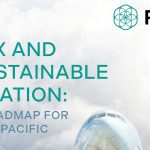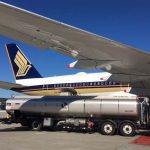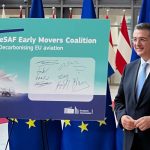RSB and Air bp announced their partnership in a sustainable aviation fuels (SAF) book and claim pilot earlier this year and, as part of the pilot, were joined by Microsoft, United Airlines and the Sustainable Aviation Buyers Alliance (SABA) to record the first transaction in the RSB book and claim register. With an approximate 80% reduction in lifecycle emissions in comparison with fossil jet fuel, 7,000 gallons (21 tonnes) of waste-based SAF were supplied by Air bp to United Airlines at UK airports. The sustainability attributes of the fuel were purchased by and credited to Microsoft, a founding company of SABA, which is managed by RMI and the Environmental Defense Fund, reports Susan van Dyk. The transaction was audited and verified by RSB, and the SAF credits were recorded in a book and claim register and retired by Microsoft after the fuel was used. Experience from the pilot scheme, together with broad stakeholder consultations, are contributing to the development of a book and claim manual by RSB, which will establish the rules for a robust, credible and transparent system that verifies the emission reductions achieved while avoiding double counting. Bryan Fisher, Managing Director of RMI’s Climate-Aligned Industries programme, said the book and claim system was “a gamechanger” for the SAF market.
“Virtual ownership of SAF’s environmental attributes can accelerate the technology by unlocking new payers and their resources, and that is why SABA has prioritised participation in this pilot,” he said.
A book and claim system allows the separation of the physical SAF from its sustainability attributes and permits a company to purchase and claim the emission reductions from SAF use regardless of the physical fuel supply location. The company purchasing the sustainability attributes does not use the physical fuel, but claims the SAF credits, which represents a volume of CO2 emissions prevented. In this case, Microsoft purchased 21 SAF credits, representing 21 tonnes of SAF, resulting in a reduction of 53 tonnes of CO2 (calculated on the basis that one tonne of fuel emits 3.16 tonnes of CO2 and an 80% lifecycle reduction). As the customer does not have to use the fuel, purchasing the SAF credits are not limited to fuel users such as airlines but can be done by any company who wants to reduce their Scope 3 emissions.
United and Microsoft have previously purchased SAF, but this was the first time SAF environmental attributes have been transferred using RSB’s book and claim system. RSB is developing the system with input from multiple stakeholders across the aviation value chain, including airlines, fuel producers, corporate customers and others. Feedback from stakeholders and learning experiences during the pilot scheme will help RSB to develop rules in a book and claim manual as a guide for a robust, credible and transparent system that can be used by any stakeholder.
Transactions under a book and claim system will be recorded in a registry, which SABA will be developing in collaboration with RSB and Clean Skies for Tomorrow (CST), said Kim Carnahan, SABA Secretariat Lead and Senior Director Net Zero Fuels at ENGIE Impact. This universal electronic ledger or registry will be compatible with the RSB book and claim system, which will detail the rules for how credits can be booked and claimed. Carnahan further explained that the book and claim manual would allow environmental attributes from any SAF certified by RSB and ISCC to be claimed under the system.
The greatest concern with book and claim transactions is the risk of double counting occurring when SAF emissions may be counted more than once towards a climate mitigation effort. Pedro Piris-Cabezas, Director of Sustainable International Transport and Lead Senior Economist at the Environmental Defense Fund (EDF) discussed the risk at the recent RSB Annual Conference. Avoiding double counting starts with a robust book and claim system from an ICAO-approved Sustainability Certification Scheme such as RSB, he explained, with transactions recorded in a registry.
While there is a risk of double counting between air carriers and corporations, the accounting of emissions reductions by countries in their national inventory reports also poses a risk for double counting. Piris-Cabezas recommends the fuel supplier must secure a commitment from the host country to report the SAF as international bunker fuel in its national inventory reports to ensure that emissions reductions are not claimed twice. Under UNFCCC rules, international bunker fuels (aviation and shipping) are reported separately and are a source of emissions not addressed under countries’ Nationally Determined Contributions (NDCs). Piris-Cabezas also highlighted the potential impact of a country’s policy environment and incentive schemes for SAF purchase under a book and claim system as a fuel producer would not be able to claim emission credits for the same SAF. SABA is providing guidance on how to simultaneously address UK policy requirements (as the SAF for the pilot was supplied and used in the UK) and recognise the emissions benefits for voluntary corporate purchases.
According to Elizabeth Willmott, Carbon Program Manager at Microsoft, the pilot offers the opportunity to ensure transparency and credibility for environmental claims for SAF purchases. RSB’s new Executive Director, Elena Schmidt, welcomed the participation of Microsoft and United in the RSB pilot project, which she said “took the pilot into the real world”. Microsoft’s commitment to sourcing RSB-certified fuel is an example of how companies can use their buying power to drive positive impacts, even outside their direct supply chains, she added.
Kelley Kizzier, EDF’s VP Global Climate, said SABA was looking forward to applying the lessons learned from the pilot to the development of an electronic book and claim registry, alongside RSB, so that more air transport customers could benefit.
At the recent COP26 climate talks in Glasgow, SABA announced the addition of an Aviators group to their membership, formed by Amazon Air, Alaska Airlines, JetBlue and United Airlines. SABA said the new group would help “send even stronger demand signal to drive greater SAF production, price reduction and technological innovation”. EDF and RMI also unveiled SABA’s formal membership structure at the COP26 event, opening membership opportunities to airlines, companies and non-profit organisations.
SABA was launched by RMI and EDF in April 2021 with founding members Boeing, Boston Consulting Group, Deloitte, JPMorgan Chase, Microsoft, Netflix, Bank of America, McKinsey & Company, and Salesforce, with Meta (formerly Facebook) later joining as a founding member.
Photo: SABA’s Kim Carnahan presents the initiative during COP26. The event included a keynote from US Transportation Secretary Pete Buttigieg and a panel session with representatives from United Airlines, Alaska Air, Amazon, McKinsey & Company and Deloitte. A YouTube video recording is available here
















More News & Features
Lessons learned from the collapse of Fulcrum BioEnergy
Early data shows uncertainty that UK SAF mandate can be met in its first year
Swiss advanced SAF technology startups Metafuels and Synhelion reach project milestones
PtX fuels have significant Asia-Pacific potential but face many barriers, finds report
Airfreight giants DHL Express and FedEx announce big US SAF deals
Asia-Pacific study reveals pessimistic outlook for SAF uptake by 2030 as Singapore details levy